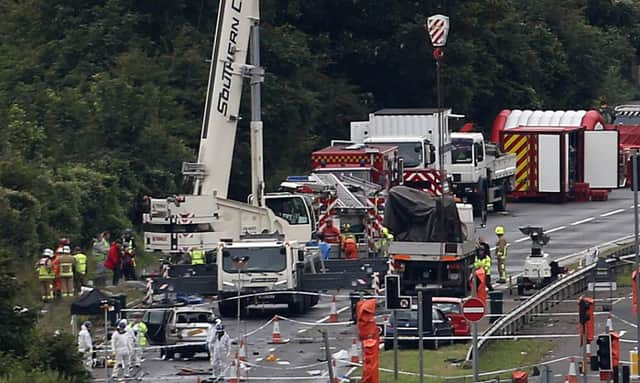Leaders: CAA decision not a moment too soon


It is now believed up to 20 people may have died on Saturday as a plane ploughed into a busy road during a demonstration at Shoreham, West Sussex, the third air display accident in recent weeks.
The CAA’s “urgent review” of civil air displays will see vintage planes banned from performing over land – with any aerobatics forced to move to areas above water. Instead, they will be limited to flypasts, which means that “high energy” aerobatics will not be permitted. Military display teams will not be affected. Hawker Hunter aircraft, the machine involved in the weekend’s tragic events, will not be allowed to fly at all until further notice.
Advertisement
Hide AdAdvertisement
Hide AdThese displays, including the Scottish Air Show, which is due to take place in Ayr next month, often involve vintage planes: huge, metal constructions travelling at hundreds of miles per hour. And while experts insist that these planes are painstakingly maintained, they are, by definition, old – without the benefit of the latest technology.
The risks of flying planes like this for fun, allowing them to take part in daredevil displays, cannot be calculated. A plane falling out of the sky is, without exception, going to cause damage – major damage – if it comes into contact with human beings. The Shoreham plane was described by onlookers as a “fireball” after it hit the A27, where motorists, cyclists and air show visitors were going about their daily business.
While displays of this kind are without doubt entertaining, it was only a matter of time until something went wrong. Sadly, for the people of Shoreham, for the members of the public killed on the A27 and for pilot Andy Hill, who is currently lying seriously ill in a medically induced coma, that time has now come.
While there have been no recorded “civilian” air display deaths in the UK since 2000, a total of 11 pilots have been killed in nine separate accidents. These were not pilots who have died while engaged in military combat – or even, as Mr Hill did during his time at British Airways, while transporting people around the globe. They died while trying to entertain – a situation which could have been easily avoided.
We ban graduates from throwing their mortar boards in the air in case they injure someone. Librarians are prohibited from accessing high book shelves in case they damage themselves. Yet, up until now, we have allowed large, metal vehicles packed with fuel to perform potentially dangerous tricks above our heads. The CAA’s decision is just basic common sense.
Caffeine habit leaves lingering taste
WE ARE a nation of coffee addicts. And a nation with too much money on our hands if a new report into our coffee shop habits is to be believed.
Scots spend a total of £30 million in coffee shops every year – a figure which rises to £4.5 billion when you add on the addiction of our cousins south of the border.
Some of us visit a coffee shop 15 times a month – that equates to every other day – forking out up to £515 a year on our latte, cappuccino or flat white habit.
Advertisement
Hide AdAdvertisement
Hide AdWhile just a few years ago, coffee was practically unfashionable – a muddy cup of instant granules, diluted with a splash of cold milk – now, it has become a major industry. A grande soya latte with caramel syrup and whipped cream is more of a dessert than a drink, yet people insist on continuing to call it coffee, while many regard a shot of espresso – in whatever form – as an essential start to the working day.
Like the bottled water industry, which has managed to convince us that paying for sealed plastic containers of something we can get free from the tap is essential, the coffee boom has a touch of the emperor’s new clothes about it.
As the report points out, for the cost of a takeaway cup of java every two days, we could buy a top of the range home espresso machine and a year’s supply of coffee – and have change left over. In the long run, far cheaper – and better for the environment.
Meanwhile, we agonise over the necessity of food banks, which are relied upon by families who can’t make ends meet. Perhaps putting this startling £4.5bn figure on our caffeine addiction might make us wake up – and smell the coffee.